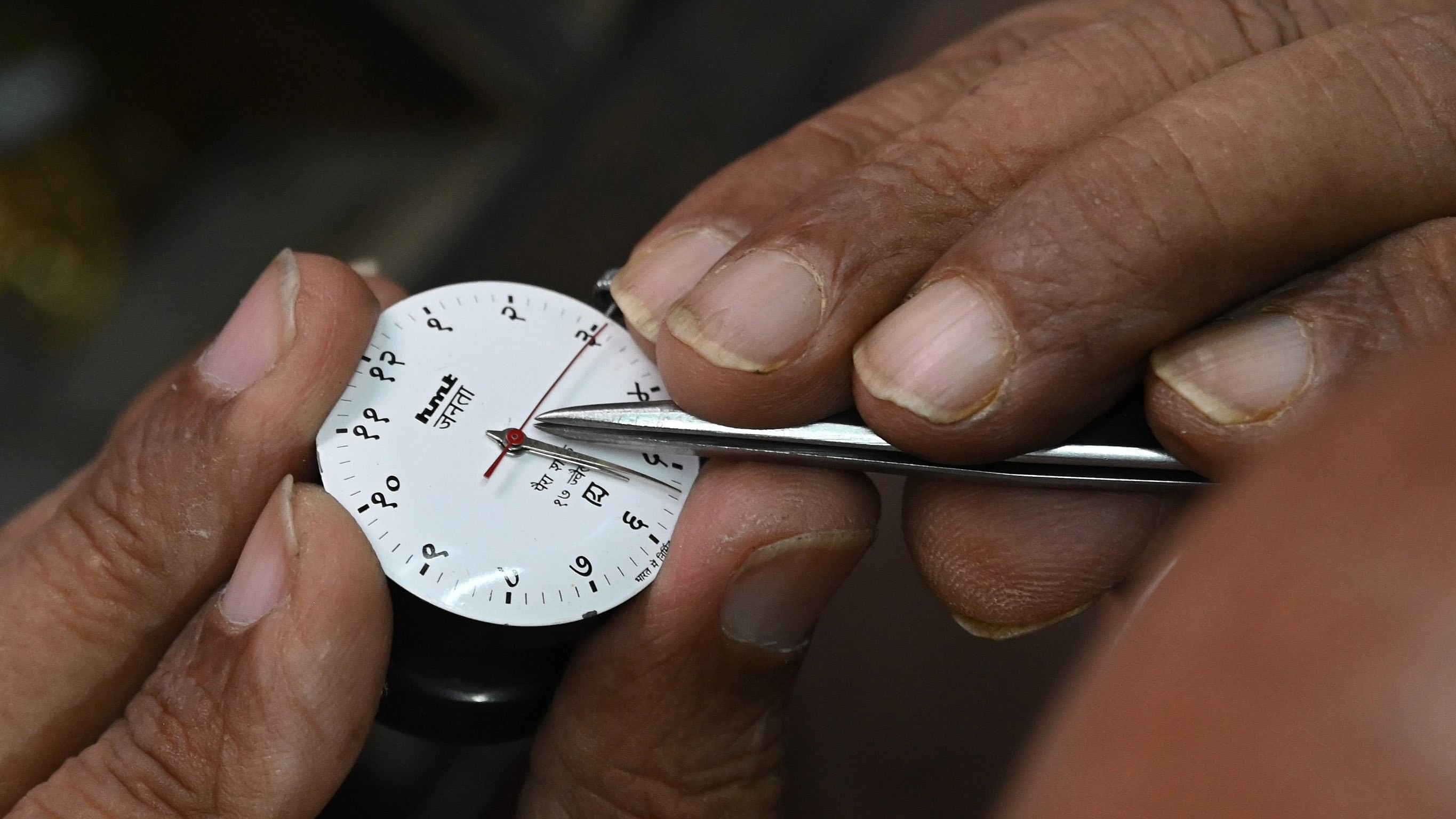
For Spectrum: Watchmaker Ali Nawaz Khan meticulously restores a mechanical timepiece bringing it back to life, in his cozy Sultanpete shop, Bengaluru.
Credit: DH Photo/Pushkar V
(This story is part of a weekly series on a range of professions gradually disappearing from daily life, right from knife sharpening to pottery.)
To a visitor at Chickpet’s Karnataka Watch Works, time seems to tick backwards. The quaint old place, stands the test of time. Interrupted by an unexpected visitor, 77-year-old Ali Nawaz Khan, horologer and owner of the shop says, “Who are you?” when he means, “Why are you here?”
Khan’s journey through the world of timekeeping began with his work at A R Khaleel and Sons as a watch mechanic back in the late 1960s. They were once considered the go-to watch dealers, under the brand name 'Skymaster'.
“In those times, we were the first to have service linked to sales,” Khan says. “By the late 1970s, we would repair at least 65 watches a day.”
The art of timekeeping
Going down memory lane, Khan recalls, “We used to have the best brands – Longines, Omega, Tissot, Rolex, Favre-Leuba. The mechanics would be lined up at our service station with white aprons and a magnifying glass.” He narrates this as he shows the remains of an old Camy watch.
Khan later headed the team of technicians at Skymaster. By 1978, the Khaleels, who were the pioneer importers of Swiss watches, became exclusive dealers of Hindustan Machine Tools (HMT) Limited watches. Headquartered in Bengaluru and carrying the tagline of “the timekeepers of the nation”, HMT was the brainchild of then Prime Minister Jawarharlal Nehru.
After learning about the ebb and flow of business and the art and craft of timekeeping from the Khaleels, Khan started Karnataka Watch Works in 1981.
For Khan, repairing a mechanical watch is like solving a puzzle. “A mechanical watch has at least 120 components, or more. A slight displacement or relocation can make a huge difference,” he says as he points to the various paraphernalia that work behind the ticking of time.
A normal quartz watch has only 30 to 40 components. Repairing them does not require prolonged training or experience, according to Khan. “Anybody can change a battery on a quartz. But when time goes wrong in a mechanical watch, it needs a mechanic to fix it.”
Khan says once he dismantled a mechanical watch, he would not get up until he was done fixing it.
What makes a horologer?
While institutionalised courses in watch mechanics are a thing of the past, the world still needs skilled men as long as people wear wristwatches, says a horologer who works with HMT at its ancillary business division in Jalahalli.
The horologer adds, “After quartz began to rule the markets, the old-school mechanical watches fell out of favour. HMT made quartz watches too, but was not up to date with the technology. So the businesses started to plummet.”
He studied a three-year diploma in horology at Hegde and Golay, a private watch-making enterprise in pre-liberalisation Bengaluru, in the batch of 1977. The new horologer then joined the HMT factory’s assembly ancillary in Tumakuru in 1981, and worked here till 2002.
“We had close to 1,200 to 1,300 training centres all over India. When HMT shut down factories in 2016, the training centres also pulled down their shutters,” he says. This training, which was given free of cost, provided an “authorised by HMT” certification for those who graduated.
Where did the horologers go?
Several thousand ticks of the clock down the line, Satish Kumar B, who works as a watch technician at a Titan showroom in Bengaluru says he was never “conventionally trained” in horology. “I learnt the mechanics of watches from clock repairers in a smaller watch store and moved to Titan later,” he says.
Today, several horology enthusiasts organise short-term courses and certificate programmes in clock repair and watch mechanics. There are also many one-day workshops on clock-making. However, artisans dedicated to mechanical wristwatch servicing are a rarity.
In 2010, Phoenix Watch Works, a British-era watch servicing agency was demolished. The service centre, once stood where the MG Road metro station is located now.
Several people reminisce about watch repair stores from their childhood — musty chambers with men carefully examining wristwatches with a magnifying glass. Kunal Ambasta, a lawyer and retro watch collector thinks that with time, we have come to see watches as disposable things. “The sentimental value of watches is disappearing. People just get another watch, without going for repair. Replacing a watch is easier than getting it repaired,” he says.
“People may prefer quartz and digital watches today for accuracy in time and low maintenance requirements. Only those with patience and a penchant for watches go back in time and find places to get them,” says Ambasta.
Balu, at the HMT service centre in Jalahalli, says it is the last HMT-associated service centre in India. As I bought a watch from him on Monday and asked what I would do if it stopped functioning, Balu says, “Today we are here to fix it. Tomorrow, if you cannot travel this far, courier it. I am not sure what will happen next year.”
While Ali Nawaz Khan’s Karnataka Watch Works stands the test of time, watch mechanics like Balu are uncertain about the future of their craftsmanship.